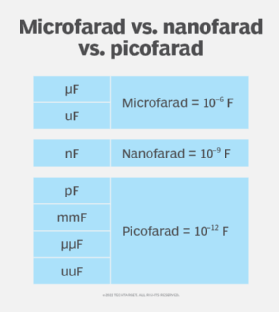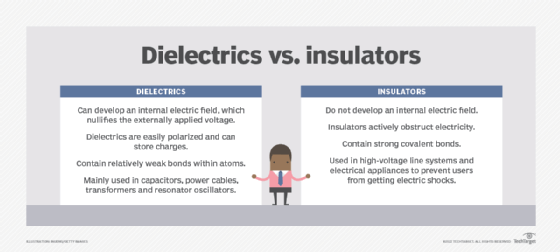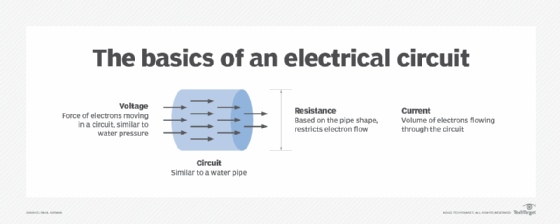What is a capacitor (capacitance)?
A capacitor is a passive electronic component that stores electrical charge. The amount of energy that a capacitor can store is called capacitance. Capacitance is measured in farads. Capacitors are used in almost every electronic circuit.

Capacitors can store small amounts of electrical energy. In this way, they can be thought of as working like a rechargeable battery. However, they store much less energy by size and weight than a battery can.
Supercapacitors can store much more energy than other capacitors, but still have less energy density than most rechargeable batteries, like lithium-ion batteries. Capacitors can be charged and discharged much faster than batteries, though, even up to millions of times a second.
The unit of capacitance is the farad, abbreviated as F. A farad is a large unit, and most capacitors used in circuits only store microfarads, nanofarads or picofarads. Large supercapacitors are able to store tens of farads, however.
How do capacitors work?
The job of a capacitor is to store a small amount of electrical charge or energy. They consist of two conductors separated by an insulator. Imagine a sandwich consisting of a metal plate, the insulator and another plate. The insulator is called a dielectric.
When a charge is applied to one conductor, the opposite charge is attracted to the other conductor. Electrons will be attracted to the negative side and repelled from the positive side, but the insulator stops them from directly going from one side to the other. The attractive force causes the charge differential to accumulate, storing electricity. Once the maximum capacity to store charge is reached, the capacitor is "full" and no more current flows. When a path allows the electricity to flow through another part of the circuit, the capacitor will discharge its stored energy.

The amount of charge that a capacitor can store -- its farad rating -- is directly related to the surface area of the conductors, how close together the conductors are and the ability of the dielectric to resist electron flow.
Early capacitors used metal foil separated by special paper, which could be rolled into cylinders. Ceramic, mica or polymer film capacitors use different dielectrics and are often used for small-value capacitors. Electrolytic capacitors use an insulating oxide layer on a metal sustained by an electrolyte solution. Capacitors can even be directly etched into the semiconductor of an integrated circuit.
Capacitors are one of the most common failure points in electronics. They often contain a liquid electrolyte or other dielectric that can break down over time. Eventually, it can burn out or even explode, causing the entire circuit to fail. Swollen, bulging or popped electrolytic capacitors are a common sight in damaged power supplies. Often, these capacitors can be replaced, restoring the circuit's functionality.
What are capacitors used for?
Capacitors are one of the most common electrical components and are used in almost every electronic device. They have many uses that affect every part of our lives.
Smoothing capacitors regulate the flow of electricity and keep it consistent. They can be thought of as small reservoirs of electricity that can momentarily store extra electricity and release it when the flow starts to drop. For example, in an alternating current to direct current converter, a rectifier takes the AC power and turns it into pulsed DC. A capacitor can take the pulses of power and change them to a smooth flow.

Even when power is removed from a circuit, capacitors can still have some stored electricity. So, care must always be taken before working on electronics.
Coupling and decoupling capacitors can remove or filter unwanted noise or signals in a circuit. For example, a small capacitor can be put next to a sensitive integrated circuit (IC) to prevent small changes in power from affecting it. Or one part of a circuit might deal with high-power, low-frequency power smoothing, but another part deals with high-frequency radio transmission, so capacitors are used to make sure that these two parts of the circuit do not interfere with one another.
Capacitors can also be used as part of a frequency filter. They resist low-frequency signals and pass high-frequency signals, as the capacitor has more time to charge and discharge when high frequency is applied. Inductors work the opposite way, resisting high frequency and passing low frequency. By pairing an inductor and a capacitor, a circuit can be created that only allows certain frequencies to pass and blocks all others. This is very useful in radio communication. For example, this can be used to select the channel on a radio, or filter unwanted noise from a Wi-Fi or 5G signal.
Capacitors can also be used to store information. By pairing a capacitor with transistors on an IC, dynamic RAM or memory can be created. The capacitor can momentarily store a charge representing a bit of data, while the transistors constantly check and refresh the capacitor. If power is lost, the charge in the capacitor is quickly lost, causing the stored value to vanish.
Charge-coupled devices (CCDs) use capacitors on an IC to measure light in a digital camera sensor. Each time a photon strikes a cell in the CCD, a small amount of charge is added to the capacitor for that cell. The charge on the capacitor can then be measured to give a raw value for how "bright" that cell was. These brightness values can then be combined and processed to create the image.
Capacitive touchscreens and trackpads use the natural conductance of the human body as part of a simple capacitor. When a finger or other conductive object is placed on the touchpad, sensors measure the resulting capacitance and use that to determine where it was placed. These sensors can be extremely sensitive, leading to high accuracy and responsiveness.
Microfarads and farads are a small part of data center efficiency. Find out more about building an efficient data center. Also, learn how generators, batteries and backup power options like uninterruptible power supplies work together to protect data centers against the effects of power outages.
